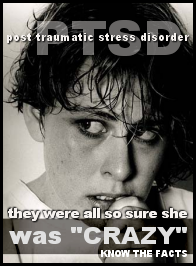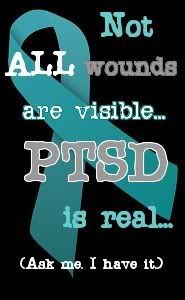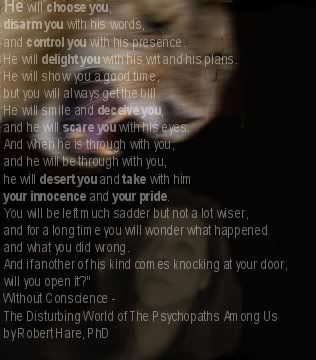EOPC has taken excerpts from the late Tim Field's seminal work on Bullying and adjusted it for the victims of Cyberpaths. It fits the criteria and should be illustrative for both victims & their friends/ family.The PTSD any victim has have from any dealings with a cyberpath:- is not something you should be ashamed of, you did NOTHING wrong.
- You had NO WAY of knowing the cyberpath's true intentions.you are NOT at fault in any way -- you need to be validated.
- Saying "get over it" or "it's no big deal" to you is re-victimizing you-- you need properly trained therapists.
- If your therapist tells you to "just move on" -- you may need a new therapist or to educate your current one.
PTSD, Complex PTSD and bullying

It's widely accepted that PTSD can result from a single, major, life-threatening event, as defined in DSM-IV. Now there is growing awareness that PTSD can also result from an accumulation of many small, individually non-life-threatening incidents. To differentiate the cause, the term "Complex PTSD" is used.There has recently been a trend amongst some psychiatric professionals to label people suffering Complex PTSD as a exhibiting a personality disorder, especially Borderline Personality Disorder. This is not the case - PTSD, Complex or otherwise, is a psychiatric injury and nothing to do with personality disorders.It seems that Complex PTSD can potentially arise from any prolonged period of negative stress in which certain factors are present, which may include any of:- lack of means of escape,
- entrapment,
- repeated violation of boundaries,
- betrayal,
- rejection,
- bewilderment,
- confusion,
- and - crucially - lack of control, loss of control and disempowerment.
It is the overwhelming nature of the events and the inability (helplessness, lack of knowledge, lack of support etc) of the person trying to deal with those events that leads to the development of Complex PTSD.Situations which might give rise to Complex PTSD include bullying, harassment, abuse, domestic violence, stalking, unresolved grief, [emotional rape, involvement with a cyberpath, betrayal], etc.Until recently, little (or no) attention was paid to the psychological harm caused by [cyberpathy]. Misperceptions (usually as a result of the observer's lack of knowledge or lack of empathy) still abound: "It's something you have to put up with" (like rape or repeated sexual abuse?) and "It will toughen you up" (ditto).

Stalker types
Intimate partner: this stalker, the most common type, is a partner or more usually an ex-partner who can't and wont accept that a relationship has come to an end. They can't let go.
Vengeful stalker: this is the most dangerous type whose mission is to get even and/or take revenge. Mostly male, he has a grudge and he's going to do something about it.
Delusional stalker: this one has a history of mental illness which may include schizophrenia or manic depression and psychopathy. This stalker may have stopped taking his or her medication and now lives in a fantasy world composed of part reality and part delusion which he is unable to differentiate. If they're not careful, targets of the delusional stalker are likely to be sucked in to this fantasy world and start to have doubts about their own sanity, especially if the stalker is intelligent, and intermittently and seamlessly lucid and appears "normal".
Erotomaniac: this stalker is also delusional and mentally ill and believes he or she is in love with you and will have created an entire relationship in their head.
Variations
Harasser stalker: some stalker types like to be the center of attention and may have an attention-seeking personality disorder; they may not be stalkers in the strict sense of the word but repeatedly pester anyone (especially anyone who is kind, vulnerable or inexperienced) who might be persuaded to pay them attention. They may select a victim who they stalk by fabricating claims of harassment by this person against themselves. Click here for more on attention-seeker personality types.
Cyberstalkers, Cyberpaths and love rats: again, these may not be stalkers in the strict sense of the word but they have many similar characteristics. Cyberstalkers and love rats surf the web with the intention of starting relationships and may have several simultaneous relationships. The targets of a cyberstalker may know little about the person they are talking to (other than what they've convincingly been fed) and be unaware of a trail of other targets past and present. [BBC News Online item]
Troll. The Troll's purpose is to be given more credibility than (s)he deserves, and to suck people into useless, pointless, never-ending, emotionally-draining, ranting discussions full of verbal loops and "word labyrinths" (word salad), playing people against each other, hurting their feelings, and wasting their time and emotional energy. [More on Trolls]
It's common for stalkers to exhibit characteristics of more than one of these stalking types.
Warning signs
These are the signs to be alert to:
-
refuses to accept "no" for an answer
-
isolates you from your friends and/or family or harasses your friends/ family
-
puts you down in front of your family or friends
-
sends frequent unsolicited or unwelcome gifts
-
makes offers of unsolicited help
-
excessive niceness in the early stages
-
use of guilt to manipulate your feelings or to force you into courses of action you feel uncomfortable with
-
extreme jealousy
-
frequent loss of temper
- follows you everywhere online or off
-
threats
-
emotional and verbal abuse
-
threats of damage or destruction to your property
-
talks about violence or is fascinated with themes of violence
-
makes your family or friends feel scared or uneasy
[Dealing with a Cyberpath], often over a period of months or years, results in symptoms of Complex Post Traumatic Stress Disorder. How do the PTSD symptoms resulting from bullying meet the criteria in DSM-IV?A. The prolonged (chronic) negative stress resulting from dealing with a [cyberpath] has lead to threat of loss of job, career, health, livelihood, often also resulting in threat to marriage and family life. The family are the unseen victims.
A.1.One of the key symptoms of prolonged negative stress is reactive depression; this causes the balance of the mind to be disturbed, leading first to thoughts of, then attempts at, and ultimately, suicide.
A.2.The target of the cyberpath may be unaware that they are being exploited, and even when they do realize (there's usually a moment of enlightenment as the person realizes that the criticisms and tactics of control, etc are invalid),
they often cannot bring themselves to believe they are dealing with a disordered personality who lacks a conscience and does not share the same moral values as themselves.
Naivety is the great enemy. The target is bewildered, confused, frightened, angry - and after enlightenment, very angry.
B.1. The target experiences regular intrusive violent visualizations and replays of events and conversations; often, the endings of these replays are altered in favour of the target.
B.2. Sleeplessness, nightmares and replays are a common feature.
B.3. The events are constantly relived; night-time and sleep do not bring relief as it becomes impossible to switch the brain off. Such sleep as is achieved is non-restorative and people wake up as tired, and often more tired, than when they went to bed.
B.4. Fear, horror, chronic anxiety, and panic attacks are triggered by any reminder of the experience, e.g.receiving threatening letters or email from the [cyberpath or their friends, their family or attorneys. Additionally postings on online boards or sites about the victim can add to these triggers and health related issues tremendously.]
B.5. Panic attacks, palpitations, sweating, trembling, vomitting, binge eating or forgetting to eat, ditto.
Criteria B4 and B5 manifest themselves as immediate physical and mental paralysis in response to any reminder of the [cyberpathy] or prospect being forced to take action against the [cyberpath].
C. Physical numbness (toes, fingertips, lips) is common, as is emotional numbness (especially inability to feel joy). Sufferers report that their spark has gone out and, even years later, find they just cannot get motivated about anything.
C.1. The target tries harder and harder to avoid saying or doing anything which reminds them of the horror of the exploitation.
C.2. Almost all callers to the Workplace Bullying Advice Line report impaired memory; this may be partly due to suppressing horrific memories, and partly due to damage to the hippocampus, an area of the brain linked to learning and memory
C.3. the person becomes obsessed with resolving the experience which takes over their life, eclipsing and excluding almost every other interest.
C.4. Feelings of withdrawal and isolation are common; the person just wants to be on their own and solitude is sought.
C.5. Emotional numbness, including inability to feel joy (anhedonia) and deadening of loving feelings towards others are commonly reported. One fears never being able to feel love again.
C.6. The target becomes very gloomy and senses a foreshortened career - usually with justification. Many targets ultimately have severe psychiatric injury, severely impaired health.
D.1. Sleep becomes almost impossible, despite the constant fatigue; such sleep as is obtained tends to be unsatisfying, unrefreshing and non-restorative. On waking, the person often feels more tired than when they went to bed. Depressive feelings are worst early in the morning. Feelings of vulnerability may be heightened overnight.
D.2. The person has an extremely short fuse and is often permanently irritated, especially by small insignificant events. The person frequently visualises a violent solution, e.g. arranging an accident for, or murdering the cyberpath; the resultant feelings of guilt tend to hinder progress in recovery.
D.3. Concentration is impaired to the point of precluding preparation for legal action, study, work, or search for work.
D.4. The person is on constant alert because their fight or flight mechanism has become permanently activated.
D.5. The person has become hypersensitized and now unwittingly and inappropriately perceives almost any remark as critical.
E. Recovery from a cyberpath experience is measured in years. Some people never fully recover.
F. For many, social life ceases and work becomes impossible.

Common symptoms of PTSD and Complex PTSD that sufferers report experiencing- hypervigilance (feels like but is not paranoia)
- exaggerated startle response
- irritability
- sudden angry or violent outbursts flashbacks
- nightmares
- intrusive recollections, replays
- violent visualizations
- triggers
- sleep disturbance
- exhaustion, adrenal fatigue and chronic fatigue
- reactive depression
- guilt
- shame
- feelings of detachment
- avoidance behaviors
- nervousness
- anxiety
- phobias about specific daily routines, events or objects
- irrational or impulsive behaviour
- loss of interest
- loss of ambition
- anhedonia (inability to feel joy and pleasure)
- poor concentration
- impaired memory
- joint pains, muscle pains (sometimes becomes Fibromyalgia and/or Chronic Myofascial Pain)
- emotional numbness
- physical numbness
- low self-esteem
- an overwhelming sense of injustice and a strong desire to do something about it.
 Associated symptoms of Complex PTSDSurvivor guilt:Levels of guilt are also abnormally raised. The person may also find themselves being abnormally and inappropriately generous and giving.Shame, embarrassment, guilt, and fear are encouraged by the [cyberpath], for this is how ALL abusers - including child sex abusers - control and silence their victims.Marital disharmony:the target becomes obsessed with understanding and resolving what is happening and the experience takes over their life; partners become confused, irritated, bewildered, frightened and angry; separation and divorce are common outcomes.BreakdownThe word "breakdown" is often used to describe the mental collapse of someone who has been under intolerable strain. There is usually an (inappropriate) inference of "mental illness". All these are lay terms and mean different things to different people. I define two types of breakdown:
Associated symptoms of Complex PTSDSurvivor guilt:Levels of guilt are also abnormally raised. The person may also find themselves being abnormally and inappropriately generous and giving.Shame, embarrassment, guilt, and fear are encouraged by the [cyberpath], for this is how ALL abusers - including child sex abusers - control and silence their victims.Marital disharmony:the target becomes obsessed with understanding and resolving what is happening and the experience takes over their life; partners become confused, irritated, bewildered, frightened and angry; separation and divorce are common outcomes.BreakdownThe word "breakdown" is often used to describe the mental collapse of someone who has been under intolerable strain. There is usually an (inappropriate) inference of "mental illness". All these are lay terms and mean different things to different people. I define two types of breakdown: Nervous breakdown or mental breakdown is a consequence of mental illness
Stress breakdown is a psychiatric injury, which is a normal reaction to an abnormal situation
The two types of breakdown are distinct and should not be confused. A stress breakdown is a natural and normal conclusion to a period of prolonged negative stress; the body is saying "I'm not designed to operate under these conditions of prolonged negative stress so I am going to do something dramatic to ensure that you reduce or eliminate the stress otherwise your body may suffer irreparable damage; you must take action now".
A stress breakdown is often predictable days - sometimes weeks - in advance as the person's fear, fragility, obsessiveness, hypervigilance and hypersensitivity combine to evolve into paranoia (as evidenced by increasingly bizarre talk).
If this happens, a stress breakdown is only days or even hours away and the person needs urgent medical help. The risk of suicide at this point is heightened.
Often the cause of negative stress can be traced to the behavior of one individual. The [cyberpath].The person who suffers a stress breakdown is often treated as if they have had a mental breakdown; they are sent to a psychiatrist, prescribed drugs used to treat mental illness, and may be encouraged - sometimes coerced or sectioned - into becoming a patient in a psychiatric hospital.The sudden transition to a ward containing schizophrenics, drug addicts and other people with genuine long-term mental health problems adds to rather than alleviates the trauma.
Words like "psychiatrist", "psychiatric unit" etc are often translated by work colleagues, friends, and sometimes family into "nutcase", "shrink", "funny farm", "loony" and other inappropriate epithets.The [cyberpath] encourages this, often ensuring that the victim's record contains a reference to the person's "mental health problems". Sometimes, the [cyberpath] produces their own amateur diagnosis of mental illness - but this is more likely to be a projection of the bully's own state of mind and should be regarded as such.
The [target] often thinks they are going mad, and may be encouraged in this belief by those who do not have that person's best interests at heart. They are not going mad; PTSD is an injury, not an illness.
Sometimes, the term "psychosis" is applied to mental illness, and the term "neurosis" to psychiatric injury. The main difference is that a psychotic person is unaware they have a mental problem, whereas the neurotic person is aware - often acutely.
The [cyberpath]'s lack of insight into their psychopathic behavior and its effect on others has the hallmarks of a psychosis, although this obliviousness would appear to be a choice rather than a condition.
Hypersensitivity and hypervigilance are likely to cause the person suffering PTSD to react unfavorably to the use of these words, possibly perceiving that they, the target, are being blamed for their circumstances.A frequent diagnosis of stress breakdown is "brief reactive psychosis", especially if paranoia and suicidal thoughts predominate. However, a key difference between mental breakdown and stress breakdown is that a person undergoing a stress breakdown will be intermittently lucid, often alternating seamlessly between paranoia and seeking information about their paranoia and other symptoms.
The person is also likely to be talking about resolving their situation (which is the cause of their problems).TransformationA stress breakdown is a transformational experience which, with the right support, can ultimately enrich the experiencer's life. However, completing the transformation can be a long and sometimes painful process.The Western response - to hospitalise and medicalize the experience, thus hindering the process - may be well-intentioned, but may lessen the value and effectiveness of the transformation.How would you feel if, rather than a breakdown, you viewed it as a breakthrough?How would you feel if it was suggested to you that the reason for a stress breakdown is to awaken you to your mission in life and to enable you to discover the reason why you have incarnated on this planet?How would it change your view of things if it was also suggested to you that a stress breakdown reconfigures your brain to enable you to embark on the path that will culminate in the achievement of your mission?
SOURCE







